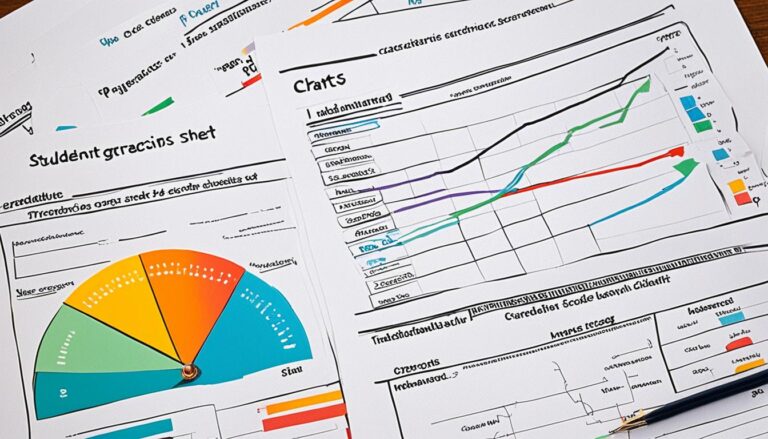Unlock Success: The Acronym for Goal Setting

Are you tired of setting goals that never seem to materialize? Do you find yourself lost in a sea of possibilities without a clear direction? It’s time to unlock your potential and achieve your aspirations with a powerful goal-setting strategy. But do you know the key acronym to remember when setting goals?
The acronym to remember for goal setting is SMART – Specific, Measurable, Achievable, Relevant, and Time-bound. SMART goals provide a framework for setting clear, attainable, and motivating goals in any area of your life. Let’s dive deeper into this goal-setting method and discover how it can revolutionize your approach to achieving success.
Key Takeaways:
- SMART goals are specific, measurable, achievable, relevant, and time-bound.
- Setting specific goals provides clarity and direction.
- Measurable goals allow you to track progress and stay motivated.
- Achievable goals are challenging yet realistic.
- Relevant goals align with your values and priorities.
Setting Specific Goals
Setting specific goals is essential for achieving success. When your goals are well-defined and leave no room for ambiguity, you create a clear roadmap towards your desired outcomes. By answering key questions about your goals, such as what needs to be accomplished, who’s involved, where it will happen, and what are the constraints, you provide clarity and direction to your aspirations.
Specific goals help you focus your efforts and energy on what truly matters. They provide a concrete target to aim for and make it easier to track your progress along the way. When you have clear, specific goals, you can identify the necessary steps and actions needed to achieve them, leaving no room for confusion or doubt.
Let’s take a look at some examples of specific goals:
- Losing 10 pounds by running 30 minutes, 3 times a week for 12 weeks
- Reading 20 books by the end of the year
These examples demonstrate how specific goals outline the desired outcome, the actions required, and the timeframe for completion. By setting such goals, you provide yourself with a roadmap that guides your actions and motivates you to stay on track.

| Benefits of Setting Specific Goals | Examples |
|---|---|
| Clarity and direction | Losing 10 pounds by running 30 minutes, 3 times a week for 12 weeks Reading 20 books by the end of the year |
| Focus and motivation | Losing 10 pounds by running 30 minutes, 3 times a week for 12 weeks Reading 20 books by the end of the year |
| Progress tracking and measurement | Losing 10 pounds by running 30 minutes, 3 times a week for 12 weeks Reading 20 books by the end of the year |
Measuring Progress with Measurable Goals
Measurable goals are an essential component of effective goal setting. They allow you to track your progress, stay motivated, and celebrate your achievements along the way. By establishing quantifiable objectives, you gain clarity and certainty in your journey towards success.
Tracking progress is crucial because it offers tangible proof of your advancement. It enables you to gauge how far you have come and how much further you need to go. With measurable goals, you can easily identify whether you’re on track or need to adjust your strategies to stay aligned with your targets.
To measure your goals effectively, it’s important to set specific indicators that can be quantified. These indicators can be expressed using numbers, dates, or percentages, allowing you to track your progress in a concrete and straightforward manner. By focusing on measurable goals, you establish a solid foundation for progress monitoring.
Here are a few examples of measurable goals:
- Save $1,000 for a down payment on a house by next summer
- Learn to speak Spanish fluently within two years

As you can see, these goals provide clear metrics that enable you to monitor your progress effectively. Whether it’s tracking your savings or language proficiency, measurable goals serve as checkpoints along your journey to success.
By establishing measurable objectives, you empower yourself to take control of your progress. You can determine where you stand, make adjustments when necessary, and confidently move closer to achieving your desired outcomes.
Achieving Realistic Goals
Achievable goals are essential for your success journey. They are challenging yet realistic, providing you with the perfect balance between pushing your limits and staying motivated. When setting goals, it’s crucial to avoid extremes. Goals that are too high may lead to discouragement, while goals that are too low may result in a lack of motivation. By setting realistic goals, you set yourself up for continuous progress and sustainable growth.
Staying motivated is vital to achieving your goals. Realistic goals provide you with a sense of purpose and direction, keeping you focused on your desired outcomes. When your goals are attainable, you are more likely to stay determined and take consistent action to move closer to your objectives.
Here are some examples of attainable goals:
- Getting a promotion at work within the next year.
- Getting certified in digital marketing within six months.
These examples demonstrate how realistic goals can be challenging yet achievable. They align with your aspirations and provide you with a clear target to work towards. Remember, success is not always measured by the size of the goal but by the progress you make along the way. Stay committed, stay focused, and watch yourself transform as you reach each milestone on your journey to success.

| Goal | Timeline |
|---|---|
| Getting a promotion at work | Next year |
| Getting certified in digital marketing | Within six months |
Aligning Goals with Relevance
When it comes to setting goals, it’s essential to ensure that they are not only specific and measurable but also relevant to your values and priorities. Relevant goals are those that align with what truly matters to you, making them more meaningful and motivating.
By setting goals that are aligned with your values, you establish a strong connection between your aspirations and your personal beliefs. This alignment provides a sense of purpose and fulfillment, driving you forward on your journey towards success.
For example, let’s say that one of your core values is environmental sustainability. A relevant goal for you might be to start a business that promotes eco-friendly practices and products. This goal not only aligns with your values but also contributes to a cause you deeply care about.
Another example of a relevant goal is improving your grades by dedicating at least two hours of daily study time. If education is a priority for you, this goal reflects your commitment to personal growth and development.
When your goals are relevant, you are more likely to stay committed and inspired throughout the journey. They provide a sense of fulfillment and satisfaction as you see yourself making progress towards something that truly matters to you.
Aligning Goals with Relevance – Examples
Here are a few examples of relevant goals:
- Starting a business that promotes environmental sustainability.
- Improving grades by studying for at least two hours daily.
- Volunteering at a local shelter to contribute to the well-being of the community.
- Building a strong network of professional connections to advance your career.
- Creating a healthy work-life balance by prioritizing self-care and personal relationships.
By aligning your goals with what truly matters to you, you can create a powerful synergy between your values, priorities, and aspirations. This synergy fuels your motivation, propelling you towards success and fulfillment.
Setting Time-Bound Goals
When it comes to achieving your goals, setting a specific deadline is crucial to your success. Time-bound goals provide you with a sense of urgency and accountability, keeping you focused and motivated throughout your journey. By establishing a target completion date, you create a timeline for your actions, enabling you to allocate your time and resources effectively.
To illustrate the effectiveness of time-bound goals, let’s look at a couple of examples:
Example 1: Complete a Certified Online Course
Imagine you want to enhance your skills in digital marketing. By setting a time-bound goal, such as completing a certified online course by December 31st, 2024, you give yourself a specific deadline to work towards. This deadline helps you stay on track, allocate dedicated study time, and measure your progress as you complete each module or assignment.
Example 2: Develop a Small Marketing Campaign
If you’re an aspiring marketer, setting a time-bound goal to develop a small marketing campaign within the next three months can propel your career forward. With a specific deadline, you’ll be motivated to plan your campaign, execute strategies, and measure its success within the given time frame. This deadline-driven approach ensures that you prioritize your tasks and take actionable steps towards achieving your goal.
By setting time-bound goals, you create a sense of urgency and ensure you make progress towards your aspirations. Remember, a goal without a deadline is just a wish. So, set your target completion dates and watch your dreams turn into accomplishments!

Conclusion
SMART goals are the key to unlocking your potential and achieving success in all areas of your life. By following this goal-setting strategy, you will gain clarity, focus, and motivation to make your dreams a reality.
Setting Specific goals ensures that you have a clear vision of what you want to achieve. Measurable goals allow you to track your progress and celebrate small victories along the way. Achievable goals challenge you while staying within your reach, driving you to continuously improve. Relevant goals align with your values and priorities, keeping you motivated and committed. Time-bound goals create a sense of urgency and help you prioritize your actions effectively.
By incorporating the principles of SMART goals into your life, you will become more organized and efficient in utilizing your time and resources. Whether it’s personal growth, professional development, or overall well-being, setting SMART goals empowers you to take control of your future and achieve the success you desire.
So, why wait? Start setting SMART goals today and embark on an exciting journey towards realizing your true potential. The power to achieve your goals is within your grasp – it’s time to unlock it!
FAQ
What does SMART stand for in goal setting?
How do specific goals help in goal setting?
What are examples of specific goals?
How do measurable goals contribute to goal setting?
Can you give me examples of measurable goals?
FAQ
What does SMART stand for in goal setting?
SMART stands for Specific, Measurable, Achievable, Relevant, and Time-bound. It is an acronym that provides a framework for setting clear, attainable, and motivating goals.
How do specific goals help in goal setting?
Specific goals are well-defined and leave no room for ambiguity. They provide clarity and direction, making it easier to track progress and measure success.
What are examples of specific goals?
Examples of specific goals include losing 10 pounds by running 30 minutes, 3 times a week for 12 weeks and reading 20 books by the end of the year.
How do measurable goals contribute to goal setting?
Measurable goals allow individuals to track their progress and know when the goal has been achieved. They provide a way to quantify the goal using numbers, dates, or percentages.
Can you give me examples of measurable goals?
Examples of measurable goals include saving
FAQ
What does SMART stand for in goal setting?
SMART stands for Specific, Measurable, Achievable, Relevant, and Time-bound. It is an acronym that provides a framework for setting clear, attainable, and motivating goals.
How do specific goals help in goal setting?
Specific goals are well-defined and leave no room for ambiguity. They provide clarity and direction, making it easier to track progress and measure success.
What are examples of specific goals?
Examples of specific goals include losing 10 pounds by running 30 minutes, 3 times a week for 12 weeks and reading 20 books by the end of the year.
How do measurable goals contribute to goal setting?
Measurable goals allow individuals to track their progress and know when the goal has been achieved. They provide a way to quantify the goal using numbers, dates, or percentages.
Can you give me examples of measurable goals?
Examples of measurable goals include saving $1,000 for a down payment on a house by next summer and learning how to speak Spanish fluently within two years.
What does it mean to have achievable goals?
Achievable goals are challenging yet realistic. They ensure that individuals do not set their goals too high or too low, keeping them motivated and on track towards success.
Can you provide examples of attainable goals?
Examples of attainable goals include getting a promotion at work within the next year and getting certified in digital marketing within six months.
How do relevant goals contribute to goal setting?
Relevant goals are aligned with an individual’s values and priorities. They ensure that the goal is important to the individual, increasing the likelihood of sticking with it.
Could you give me examples of relevant goals?
Examples of relevant goals include starting a business that promotes environmental sustainability and improving grades by studying for at least two hours daily.
What is the significance of time-bound goals in goal setting?
Time-bound goals have a specific deadline, providing a sense of urgency and accountability. They help individuals prioritize their actions and allocate their time and resources effectively.
Can you provide examples of time-bound goals?
Examples of time-bound goals include completing a certified online course in digital marketing by December 31st, 2024, and developing a small marketing campaign within the next three months.
,000 for a down payment on a house by next summer and learning how to speak Spanish fluently within two years.
What does it mean to have achievable goals?
Achievable goals are challenging yet realistic. They ensure that individuals do not set their goals too high or too low, keeping them motivated and on track towards success.
Can you provide examples of attainable goals?
Examples of attainable goals include getting a promotion at work within the next year and getting certified in digital marketing within six months.
How do relevant goals contribute to goal setting?
Relevant goals are aligned with an individual’s values and priorities. They ensure that the goal is important to the individual, increasing the likelihood of sticking with it.
Could you give me examples of relevant goals?
Examples of relevant goals include starting a business that promotes environmental sustainability and improving grades by studying for at least two hours daily.
What is the significance of time-bound goals in goal setting?
Time-bound goals have a specific deadline, providing a sense of urgency and accountability. They help individuals prioritize their actions and allocate their time and resources effectively.
Can you provide examples of time-bound goals?
Examples of time-bound goals include completing a certified online course in digital marketing by December 31st, 2024, and developing a small marketing campaign within the next three months.






